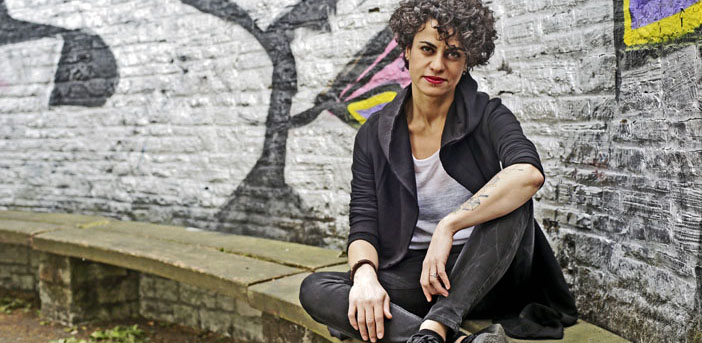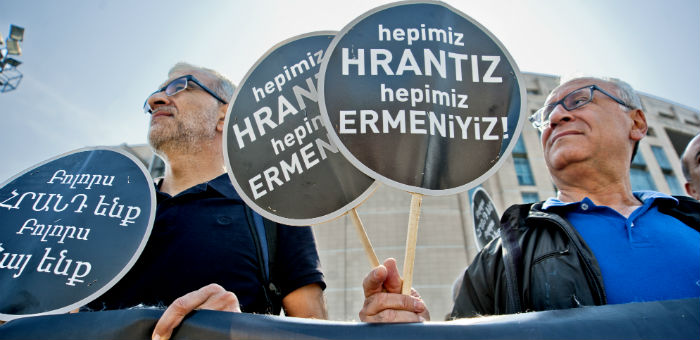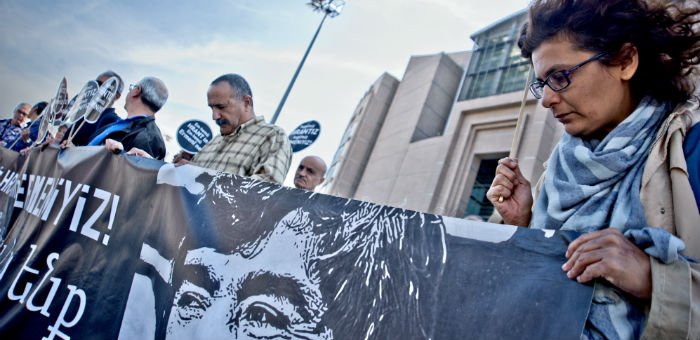We received an e-mail the other day: “Hi, it’s Lobna. A lot of people have called me for interviews, but I want to talk to AGOS as well.” So, computers were switched on in Berlin and Istanbul; and we talked about the two years that have passed since the police shot Lobna with a gas cannister during the Gezi resistance, the election results and her roots.
Perhaps not Lobna alone, but the name Lobna Allamii means a lot for a lot of people. On 30 May 2013, the day when police violence reached its peak during the Gezi resistance, Lobna Allamii’s life changed when she was hit by a gas canister shot by the police, while she was protesting along with the people, including members of parliament and human rights organization representatives in Taksim Square. Suffering damage to half of her brain, Lobna Allamii underwent three brain operations; and re-learned how to speak, write and read. Now, as she re-learns her mother tongue Arabic, Turkish, which she spoke for many years, and English, which she spoke well, she is also taking German lessons. In the interview we conducted over the internet, I observed that she had regained her ability to speak over the last two years. The doctors told her, “Don’t be afraid, you will eventually be able to speak and write, but it will take time”. Lobna says, “It has been two years. I spoke again after a year and a half; you first speak, then read, and then write. Now my languages are slowly coming back”.
‘I am a Mesopotamian’
Many interviews were conducted with Lobna Allamii after she was shot with a gas canister during the Gezi resistance and became a ‘Gezi icon’; however her life before Gezi and her roots were not the focus of these interviews. She is in fact, to use her own phrase, ‘a Mesopotamian’: Her grandmother was an Istanbullite, born of a Turkish father and a Palestinian mother. She migrated to Palestine at the age of 15, where she married a Circassian, and settled in a Circassian village. Lobna’s mother was born in Palestine, and when the Israeli state was founded when she was three years old, exile began in convoys. The exile route led to Jordan, where Lobna was born: “I do not know much about my father, but I know that his family was an Iraqi Christian family, and that they first came to Lebanon and then to Jordan because of wars,” she says. She tells me that, because in Jordan the father can take custody of female children when they reach the age of 15 without needing the mother’s consent, they fled to Turkey with her mother and sibling. “We were citizens of Turkey as well because of my grandmother, so we settled in Ankara.” To use the cliché term, her family is a ‘mosaic’ in the full sense of the word. “The only ethnicity missing in our family is Jewish, I would have loved to also have Jewish ancestry,” she adds.
Despite spending 20 years in Turkey, the things she has experienced because of her name are precisely the kind that would fit Rita Ender’s ‘Names and Stories’ column: “Whenever I say my name, people immediately ask me ‘Where are you from?’. You give someone your identity card, and again it’s the same question. Excuse me, but I speak Turkish, and as you can see, I have an identity card.” Both because she could not escape from being treated as a ‘foreigner’, and because she was fed up of the difficulties of being a woman in Turkey, she says she had already began to live in Berlin before the incident. “I worked at Kalan Music for many years, and learned many valuable things. I met Armenian, Kurdish and Arab musicians performing in Turkey, and we organized concerts with them in many countries. I decided to settle in Berlin, and found a job within a week. I worked there for three months, but my visa was about to expire, I had returned to Istanbul for a visa application. That’s when I was shot.”
‘I will file lawsuits’
Like many people who suffered police violence during the Gezi resistance, Lobna Allamii’s case has not begun yet. As the investigation continued, the process came to a halt at the expert inspection stage. The murder of prosecutor Mehmet Selim Kiraz, who was in charge of the Berkin Elvan case, caused a further extension. Lobna says she never defined herself in political terms, but that the recent election has been of great importance to everyone: “I first voted for Ecevit, when I was 18, I regretted that later. But during the run-up to this election, I even made a call for people to vote. Now we all have hope. Everybody is dancing the halay in Berlin these days. After all, we have managed to realize this change in Turkey. I will file lawsuits against all the former ruling party members of parliament who have now lost their parliamentary immunity. I do not care that much about filing lawsuits, but if Erdoğan can file so many lawsuits, and they begin immediately, then I have many lawsuits to file as well. He will be held accountable for all he has done, not only to me, but to those who were murdered during Gezi, those who were injured, and the miners who died in Soma.”
Since everyone seems to be talking about coalition combinations these days, I ask her about her choice of a coalition, “an HDP-CHP coalition,” she replies.
The Salt of the Mediterranean
These days, Lobna is excited about returning to work, as she continues to rebuild her life. She first got involved in ‘curating concerts’, or bringing together musicians who have not played together before at the Maxim Gorki Theater in Berlin, working at an event curated by Arto Tunçboyacıyan for the 100th anniversary of the Genocide and featuring Ara and Onnik Dinkjian. Now she is focusing on a series of concerts titled ‘The Salt of the Mediterranean’ to be held in September: “On the first day there will be a rebetiko concert with the participation of musicians from Turkey and Greece; and on the second day there will be concert bringing together Arab and Jewish musicians.”
Lobna’s final message is about Turkey and the future: “Please let us learn to live together in peace. I do not want Armenians and Greeks, Arabs and Kurds to disappear from Anatolia. We are witnessing a harvest of hate, but it shall not reap anything.”




